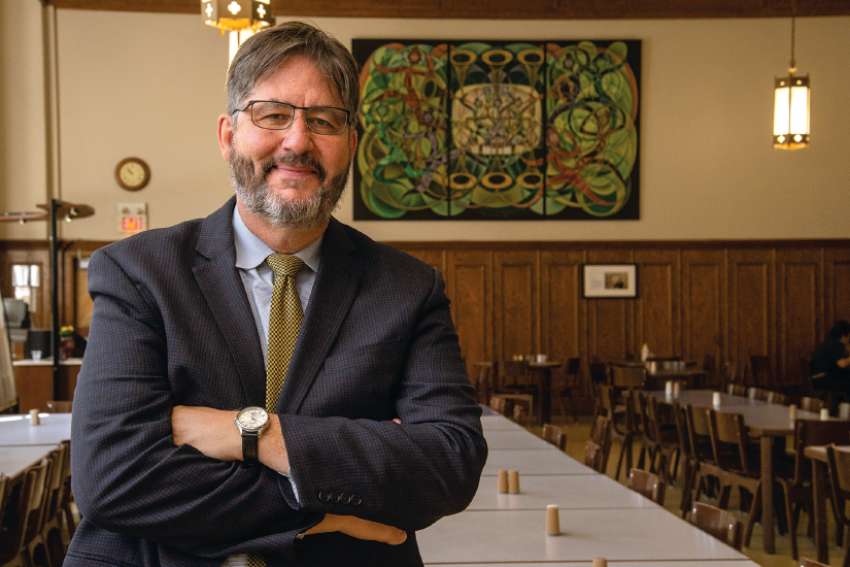“It’s not just about property management,” said David Sylvester.
It is also, he says, about building community, and he should know. Sylvester, 57, has spent a good deal of his life thinking about what a Catholic university is, what it does and what it shahas been a college president — at three different Canadian Catholic colleges — and is a past chair of the Association of Catholic Colleges and Universities of Canada who, since 2012, has been the Canadian representative on the board of the 200-member Association of Catholic Colleges and Universities based in Washington, D.C.
“I used to be the young guy on the block and now I’m the grizzled old greybeard,” he told The Catholic Register as he was getting down to work in his new office in Founders House on campus.
A former high school and elementary school teacher and a father of four with his wife Prof. Allyson Larkin, Sylvester has spent his life watching young people build an identity by learning who they are and what they can be. It’s all about experience, he said — the experience of learning together in a community.
“It’s front and centre of our mission and our pedagogy — Christian anthropology,” he said. “The road to Emmaus was as important as the Sermon on the Mount. Walking with each other was as important as being lectured to.”
The renewed Brennan Hall will this fall centralize a host of student services from registration and counselling to chaplaincy and the traditional foosball table. As of July 26, the college and alumni had raised 82 per cent of the funds needed to complete the project.
Sylvester said he hopes to bring together on-campus and commuter students to create a genuine learning and worshipping community. It’s a project that started well before Sylvester arrived this summer, but the new president is fully on board, having built a similar student life centre at King’s College in London, Ont., during the course of doubling the size of the campus over his nine years leading the college.
The B.C. native’s resume also includes serving as president of Corpus Christi College and principal of St. Mark’s College at the University of British Columbia.
Sylvester talks about forming students in terms of their experiences of friendship, mentorship, intellectual challenge and adventure, but most of all as a community bonded to one another.
“It’s the experiences — not just off-campus and internationally,” he said. “We’re whole people. We’re not just teaching math or history or theology or literature. We’re teaching people. So the experience they have in community — not just internationally or up north — those things have always been key.”
International, experiential learning courses are increasingly a feature of Catholic higher education everywhere. The Gilson Seminar in Faith and Ideas this fall will take students through a history of Catholic encounters with modernism that ends with a spring trip to Rome under the leadership of St. Mike’s principal Randy Boyagoda. There were 400 applications this year for just 40 spots in the seminar.
The St. Mike’s Book and Media Studies program is experiencing similar success with its McLuhan Seminar, which incorporates a trip to Silicon Valley for meetings with people shaping the media of tomorrow.
It is part of the reinvestment in undergraduate education set in motion by outgoing president David Mulroney. It has meant more full-time faculty and more undergraduate courses taught by full time scholar-teachers who are tied to the St. Michael’s community — not sessional lecturers.
“If Catholic educators talk about the education of the whole person, it’s not just about intellectual development,” Sylvester said. “It’s spiritual and community development, faith development, psychological. A Catholic college should be a) healthy space where students can interact with each other and be mentored by faculty, and b) faculty can be exposed to scholars from around the world.”
The next phase of renewal at St. Mike’s will be investment in high level scholarship at the graduate faculty of theology, Sylvester said. Along with the rest of the Toronto School of Theology, St. Mike’s is ranked number 11 in the world by the QS World University Rankings for theology and religious studies.
“The university is where the Church does its thinking,” he said. “For St. Mike’s to continue to flourish it has to be relevant to the questions our students are asking, the questions we face as a society — broader questions. The university is where those ideas come and are shaped and informed by a long tradition. When St. Mike’s flourishes, the Church in Toronto flourishes, frankly.”


